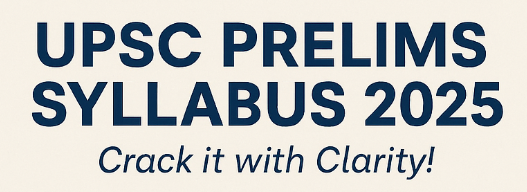
संघ लोक सेवा आयोग द्वारा आयोजित सिविल सेवा प्रारंभिक परीक्षा का पाठ्यक्रम
प्रारंभिक परीक्षा के प्रश्नपत्र-1 का संबंध ‘सामान्य अध्ययन’ से है। इसका पाठ्यक्रम निम्नलिखित है-
1. राष्ट्रीय और अंतर्राष्ट्रीय महत्त्व की सामयिक घटनाएँ (Current events of national and international importance)।
2. भारत का इतिहास और भारतीय राष्ट्रीय आंदोलन (History of India and Indian National Movement)।
3. भारत एवं विश्व का भूगोल : भारत एवं विश्व का प्राकृतिक, सामाजिक, आर्थिक भूगोल (Indian and World Geography – Physical, Social, Economic Geography of India and the World)।
4. भारतीय राज्यतंत्र और शासन- संविधान, राजनीतिक प्रणाली, पंचायती राज, लोकनीति, अधिकारों संबंधी मुद्दे इत्यादि (Indian Polity and Governance – Constitution, Political System, Panchayati Raj, Public Policy, Rights Issues etc)।
5. आर्थिक और सामाजिक विकास- सतत् विकास, गरीबी, समावेशन, जनसांख्यिकी, सामाजिक क्षेत्र में की गई पहल आदि (Economic and Social Development, Sustainable Development-Poverty, Inclusion, Demographics, Social Sector initiatives etc)।
6. पर्यावरणीय पारिस्थितिकी, जैव-विविधता और जलवायु परिवर्तन संबंधी सामान्य मुद्दे, जिनके लिये विषयगत विशेषज्ञता आवश्यक नहीं है (General issues on Environmental Ecology, Bio-diversity and Climate Change – that do not require subject specialization)।
7. सामान्य विज्ञान (General Science)।
प्रारंभिक परीक्षा के प्रश्नपत्र- 2 का संबंध ‘सीसैट’ से है। इसका पाठ्यक्रम निम्नलिखित है-
Under the new examination system, the Preliminary Examination currently includes two papers. The first paper is ‘General Studies’, while the second is known as the ‘Civil Services Aptitude Test (CSAT)’, and it is treated as a qualifying paper.
Both papers carry 200 marks each. The General Studies Paper (Paper I) consists of 100 questions, each carrying 2 marks, whereas the CSAT Paper (Paper II) contains 80 questions, each worth 2.5 marks.
Negative marking is applicable in both papers. Under this system, one-third of the marks assigned to a question are deducted for each incorrect answer — meaning three wrong answers negate one correct one.
Since CSAT has now been made qualifying in nature, a candidate needs to secure only 33% marks (around 66 marks or 27 questions) in it to qualify. If a candidate scores below this threshold, they are considered disqualified. The cut-off for the preliminary examination is now determined solely based on the marks obtained in the General Studies (Paper I).
Current events of national and international importance
History of India and Indian National Movement
Indian and World Geography – Physical, Social, and Economic Geography of India and the World
Indian Polity and Governance – Constitution, Political System, Panchayati Raj, Public Policy, Rights Issues, etc.
Economic and Social Development – Sustainable Development, Poverty, Inclusion, Demographics, Social Sector Initiatives, etc.
General issues on Environmental Ecology, Bio-diversity, and Climate Change – No subject specialization required
General Science
Comprehension
Interpersonal Skills including Communication Skills
Logical Reasoning and Analytical Ability
Decision Making and Problem Solving
General Mental Ability
Basic Numeracy (Numbers and their relations, orders of magnitude, etc. – Class X level)
Data Interpretation (Charts, graphs, tables, data sufficiency, etc. – Class X level)
Note: The Preliminary Examination consists of objective-type questions (multiple choice), where each question offers four options (a, b, c, d) and candidates must choose the correct one.